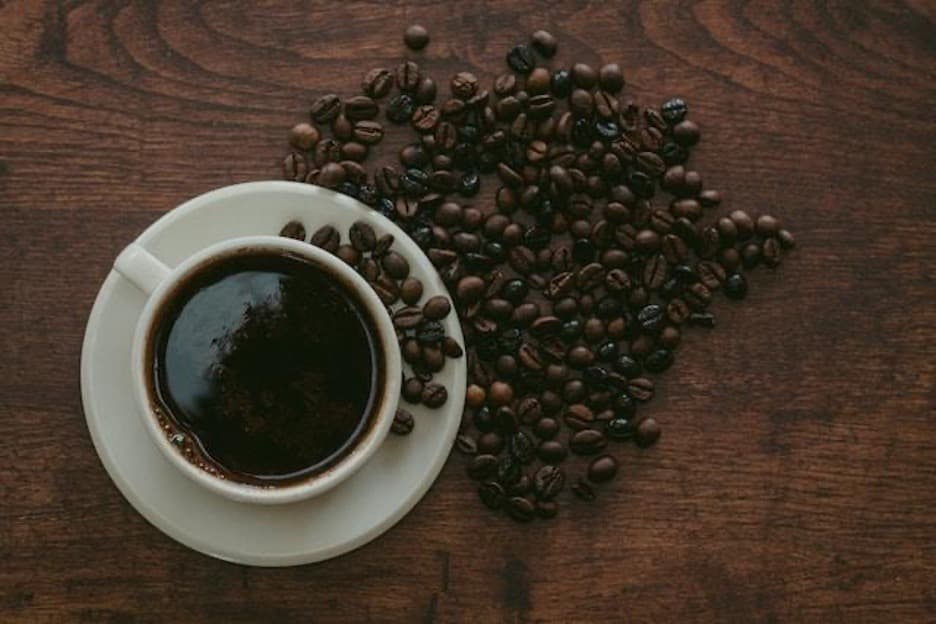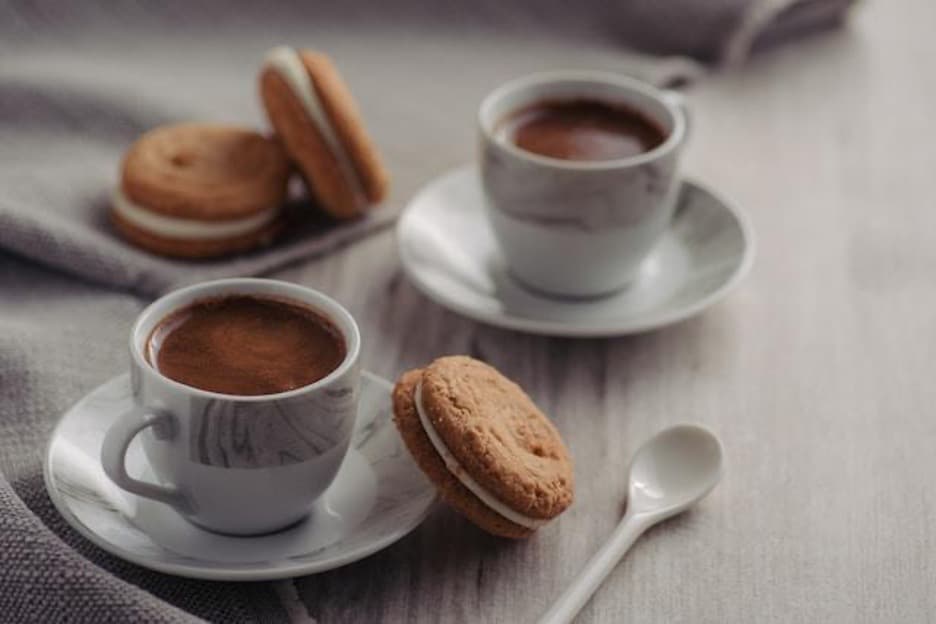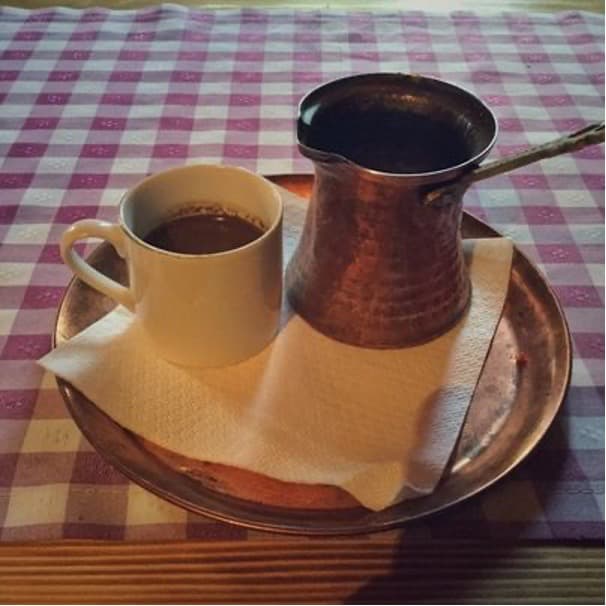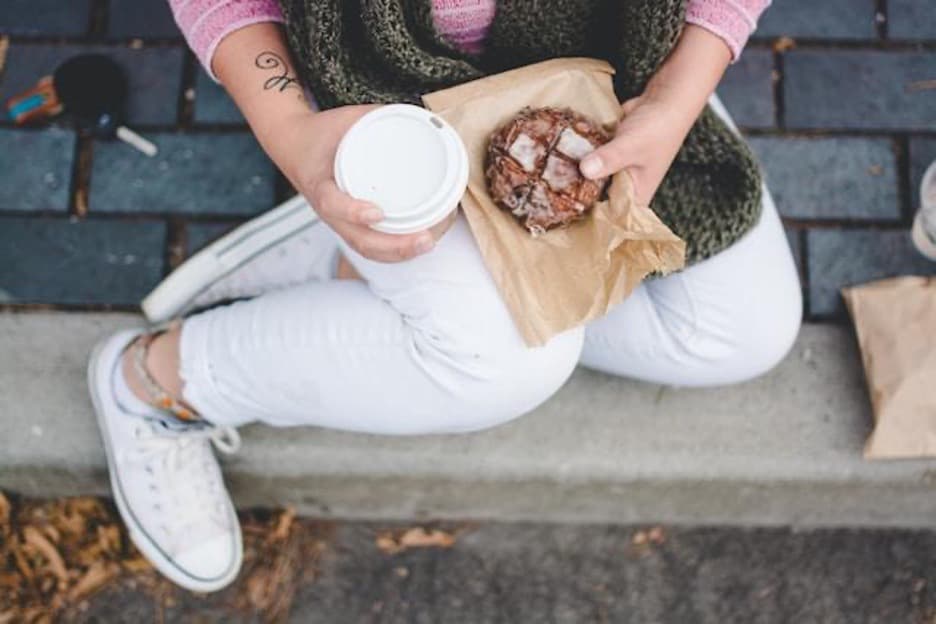Registration for Group lessons is open until December 17. Apply here
D
H
M
S

You might’ve noticed that Serbs take hours sipping their coffees in perpetually jam-packed cafes. Maybe you thought to yourself How do they find the time? So, if you want to know why Serbian coffee culture is central to this country’s social life, read on.
This article will cover why Serbs are crazy about their coffee, the kind of coffee they drink, and useful expressions in Serbian for coffeeholics. Let’s dive right in!
Serbs and coffee — a match made in heaven! It’s no secret that Serbs can’t stay away from this bitter elixir. But what’s the reason?
The truth is, coffee is so much more than a hot beverage. It’s a social lubricant, much like rakija is. Also, it’s an excuse to take a break on a hectic day.
For those who smoke, it’s something to accompany a cigarette. For superstitious, it’s a fortune-telling tool (we’ll explain later).
And more than anything else, it’s something to enjoy with friends while exchanging the latest gossip or just shooting the breeze.
Now that we got that out of the way, let’s see what kind of coffee Serbs drink.

It goes by many names — turska kafa, domaća kafa, obična kafa. In essence, it’s a kind of coffee brewed using extra-finely ground coffee.
Turska kafa is a traditional coffee in Serbia, and people have drunk it for ages. However, in recent years, it’s getting harder to find cafes that serve domaća kafa, as espresso and instant coffees (such as Nescafe) are taking over in popularity.
Nevertheless, any time you crave a cup of hot, sandy turska kafa, going to a kafana is a safe bet. That’s right, they don’t only serve rakija there. And you’ll probably get ratluk (Turkish delight) as well.
Fun fact — did you know that the word kafana comes from the Turkish word kahvehane, which means coffeehouse?
And if you want to make turska kafa at home, all you need is a džezva (coffee pot). Fill it with water and bring it to a boil. Then, add the coffee powder to the water and bring it to a boil once more.
When it starts to bubble and rise, just pour it into a šoljica (small cup). And voila! A perfect cup of coffee to spice up your day.
As for brands of Turkish coffee, some of the popular ones are Doncafe, Grand, and Bonito. Each cost under $2 per 100g and makes a great souvenir to bring back home. It’s also a perfect gift when you visit a Serbian friend’s home.

If you want to say to make coffee in Serbian, the exact translation is skuvati kafu. However, staviti kafu (the put some coffee on) is far more common.
So, for example, you can say:
Javi kad stižeš da stavim kafu.
Let me know when you’ll get here so I can put on some coffee.
Svrati do mene, stavljam kafu.
Drop by my place, I’m putting on some coffee.
Baš sam umorna. Možeš li da staviš kafu?
I’m so tired. Can you put on some coffee?
Jutarnja kafa (morning coffee) is the best way to start your day. Without it, most people wouldn’t manage to go about their day. It should be extra strong, ideally black Turkish coffee with no sugar.
For example:
Ne izlazim iz kuće bez jutarnje kafe.
I don’t leave my house without my morning coffee.
In Serbian, the four basic tastes are slatko (sweet), slano (salty), kiselo (sour), and gorko (bitter).
Obviously, you can say slatka kafa, or gorka kafa.
However, it’s more common to describe coffee with comparatives — slađa (sweeter) and gorča (more bitter).
For example, here is a typical conversation:
A: Stavljam kafu. Kakvu piješ?
I’ll put on some coffee. How do you take it?
B: Slađu.
Sweet.
If you want sugar in your coffee, you can ask using these phrases:
So if you want only a bit of sugar in your coffee, you can say:
Stavi mi šećera na vrh kašičice.
Put just a tip of a teaspoon of sugar in my coffee.
Nowadays, people are busy and prefer takeaway coffee on hectic days. In Serbian, you can say kafa za poneti.
To tell the truth, this expression isn’t correct in terms of grammar since we can’t use the preposition za in front of the infinitive. However, the expression za poneti became so widespread that everybody uses it, even those who truly care about speaking properly.
So next time you’re at a coffee shop, you can say:
Jednu kafu za poneti, molim Vas.
One coffee to go, please.

You’ve probably heard stories about the hospitality of Serbs. Maybe you even had a chance to experience it.
And precisely because most Serbs go out of their way to make their guests comfortable, overstaying your welcome is a bad idea.
There’s a fitting Serbian saying for these situations:
Svakog gosta tri dana dosta.
(Three days is enough for every guest.)
But that doesn’t mean you should set up camp in your friend’s living room for three days. It just means you shouldn’t take advantage of your host’s hospitality.
And those who do might be offered sikteruša. This tongue-twisty word refers to a cup of coffee you offer guests when it’s time for them to go home.
Ideally, they will take a hint, decline it, and go home. And those less perceptive — they just have another cup of coffee.
Remember how we mentioned that coffee can be used for fortune-telling (gatanje)? In Serbia, there’s a long tradition of gledanje u šolju (using coffee residue to predict the future).
Here’s how it works. After you finish your Turkish coffee, flip your cup upside down and place it on a saucer. Leave it for a while and, when you pick it up, you’ll see that the coffee residue left peculiar patterns on the walls of your cup.
Some people claim they can interpret these shapes and foretell the future. In particular, grandmas are known for being magic-savvy. So next time you have coffee with a baba, turn your cup, and she might tell you what the future holds.
Now that you know why coffee is so hot in Serbia — literally and figuratively — why don’t you pour a cup for yourself? Enjoy turska kafa with friends or alone and join that Serbian coffee culture.
By the way, everyone knows coffee works wonders for your focus when you’re studying a language. And if you need an additional boost, join our group Serbian lessons and enjoy conversing with other coffee lovers.
2 Responses